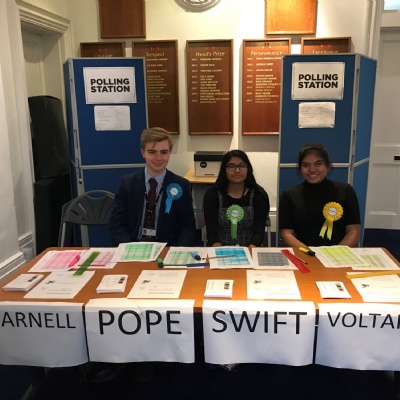It’s the Optimists Who Change the World

By the time you read this, we will know the outcome of the General Election, but it simply isn’t possible in the final week of term to wait until the last morning to put together the latest news in a coherent piece of thought – if indeed that is ever what I do when I write. So, bearing in mind that this is Radnor House and not the BBC or Sky News, I can conveniently ignore the result and write instead in more general terms.
I told the children last week that they should all take the chance to vote in our mock election at school. I do not have many strongly held beliefs, and I have changed my mind on many issues over the years, but I still hold on to the opinion that everyone should vote in an election. No matter how poor the choices appear (and I mean nationally, not at school, of course!), whether in terms of the parties or their leaders, it is surely still so much better to be able to vote than to live in a dictatorship where you never have the chance to voice an opinion or even to hear the news about what is happening in your country.
As Churchill famously said, “Many forms of government have been tried and will be tried in this world of sin and woe. No one pretends that democracy is perfect or all-wise. Indeed, it has been said that democracy is the worst form of government except all those other forms that have been tried from time to time.” He also rather more scurrilously said, “The best argument against democracy is a five-minute conversation with the average voter.” Having seen some of the interviews that the various news organisations have carried out with members of the public in the streets, cafés and pubs in our cities in recent weeks, it’s hard at times to disagree.
Our species has created the world in which we live, and in many areas it now appears to be destroying it with wanton abandon. As my go-to source of wisdom, Professor Yuval Noah Harari, highlights in Homo Deus, A Brief History of Tomorrow, as long as all the people living in a particular locality believe in the same stories, they all follow the same rules, making it easy to predict the behaviour of strangers and to organise mass co-operation networks. We often use visual marks such as a wearing a business suit to signal ‘you can trust me, I believe in the same story as you’. Our chimpanzee cousins are unable to invent and spread such stories, which is why they cannot co-operate in large numbers.
He goes on to explain that meaning is created when many people weave together a common network of stories. Why does a particular action – such as getting married in church or voting on election day – seem meaningful to me? Because my parents also think it is meaningful, as do my brothers, my neighbours, people in nearby cities and even the residents of far-off countries. And why do these people think it is meaningful? Because their friends and neighbours also share the same view. Democratic elections usually work only within populations that have some prior common bond, such as shared religious beliefs or national myths. They are a method to settle disagreements among people who already agree on the basics.
People therefore constantly reinforce each other’s beliefs in a self-perpetuating loop. Each round of mutual confirmation tightens the web of meaning further, until you have little choice but to believe what everyone else believes. Yet over decades and centuries the web of meaning unravels and a new web is spun in its place. To study history means to watch the spinning and unravelling of these webs, and to realise that what seems to people in one age the most important thing in life becomes utterly meaningless to their descendants.
For whatever reason, I still believe in democracy. If the current crop of politicians does not appear to be up to much, I need to take my share of the blame for standing by and letting it happen. If I feel that strongly about it, I have always got the option to stand up and be counted myself, join a political party, run for office and try to change the world. But it has been a very busy term at school and I haven’t finished my Christmas shopping yet, so maybe I’ll just let others get on with it for the time being. It probably won’t be long before the web starts to unravel and it will all seem meaningless after all.
In the meantime, we might as well enjoy ourselves as best we can because we have so much for which to be thankful. As the American political commentator Thomas Friedman put it, “The pessimists are usually right, but it’s the optimists who change the world.” I therefore wish you all a positive and optimistic festive season, regardless of all the other nonsense going on around us!